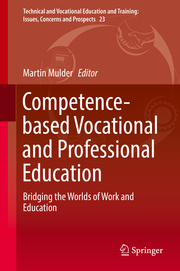Detailansicht
Competence-based Vocational and Professional Education
Bridging the Worlds of Work and Education, Technical and Vocational Education and Training: Issues, Concerns and Prospects 23
ISBN/EAN: 9783319417110
Umbreit-Nr.: 9479936
Sprache:
Englisch
Umfang: xxxiv, 1142 S., 56 s/w Illustr., 1142 p. 56 illus.
Format in cm: 5 x 24.2 x 16.4
Einband:
gebundenes Buch
Erschienen am 22.09.2016
Auflage: 1/2017
- Zusatztext
- This book presents a comprehensive overview of extant literature on competence-based vocational and professional education since the introduction of the competence concept in the 1950s. To structure the field, the book distinguishes between three approaches to defining competence, based on 1.functional behaviourism, 2. integrated occupationalism, and 3. situated professionalism. It also distinguishes between two ways of operationalizing competence: 1. behaviour-oriented generic, and 2. task-oriented specific competence. Lastly, it identifies three kinds of competencies, related to: 1. specific activities, 2. known jobs, and 3. the unknown future. Competence for the unknown future must receive more attention, as our world is rapidly evolving and there are many 'glocal' challenges which call for innovation and a profound transformation of policies and practices. The book presents a range of different approaches to competence-based education, and demonstrates that competence-based education is a worldwide innovation, which is institutionalized in various ways. It presents the major theories and policies, specific components of educational systems, such as recognition, accreditation, modelling and assessment, and developments in discipline-oriented and transversal competence domains. The book concludes by synthesizing the different perspectives with the intention to contribute to further improving vocational and professional education policy and practice.
- Kurztext
- This book presents a comprehensive overview of extant literature on competence-based vocational and professional education since the introduction of the competence concept in the 1950s. To structure the fi eld, the book distinguishes between three approaches to defi ning competence, based on 1.functional behaviourism, 2. integrated occupationalism, and 3. situated professionalism. It also distinguishes between two ways of operationalizing competence: 1. behaviour-oriented generic, and 2. task-oriented specifi c competence. Lastly, it identifi es three kinds of competencies, related to: 1. specific activities, 2. known jobs, and 3. the unknown future. Competence for the unknown future must receive more attention, as our world is rapidly evolving and there are many 'glocal' challenges which call for innovation and a profound transformation of policies and practices. Th e book presents a range of diff erent approaches to competence-based education, and demonstrates that competencebased education is a worldwide innovation, which is institutionalized in various ways. It presents the major theories and policies, specifi c components of educational systems, such as recognition, accreditation, modelling and assessment, and developments in discipline-oriented and transversal competence domains. Th e book concludes by synthesizing the diff erent perspectives with the intention to contribute to further improving vocational and professional education policy and practice. Joao Santos, Deputy Head of Unit C5, Vocational Training and Adult Education, Directorate General for Employment, Social Aff airs and Inclusion, European Commission: "This comprehensive work on competence-based education led by Martin Mulder, provides an excellent and timely contribution to the current debate on a New Skills Agenda for Europe, and the challenge of bridging the employment and education and training worlds closer together. Th is book will infl uence our work aimed at improving the relevance of vocational education to support initial and continuing vocational education and training policy and practice aimed at strengthening the key competencies for the 21st century." Prof. Dr. Reinhold Weiss, Deputy President and Head of the Research, Federal Institute for Vocational Education and Training (BIBB), Bonn, Germany: "This book illustrates that the idea and concept of competence is not only a buzzword in educational debates but key to innovative pedagogical thinking as well as educational practice." Prof. Dr. Johanna Lasonen, College of Education, University of South Florida, Tampa, USA: "Competencebased Vocational and Professional Education is one of the most important multidisciplinary book in education and training. Th is pathbreaking book off ers a timely, rich and global perspective on the fi eld. Th e book is a good resource for practitioners, policymakers and researchers."
- Autorenportrait
- Martin Mulder (1951, the Netherlands; MA Education Utrecht University, 1982; PhD University of Twente, 1992) has been a Professor and Head of the Education and Competence Studies Group (ECS) at Wageningen University, the world-leading university in agrifood and environmental sciences, since 1998. His research has evolved from curriculum studies to corporate training, human resources development, vocational education, competence development and learning. At Wageningen University he leads a teaching and research programme on competence development in the agrifood and environment sector that was recognised as being of excellent and world-leading quality in 2015. He is editor of the Journal of Agricultural Education and Extension (JAEE) and member of various editorial committees in the field of education and training. He has (co)authored and edited hundreds of academic and professional articles, chapters and books, for academic, policymaking, and practical audiences, and has served on various scientific boards in his field. He has presented his work all over Europe, the Americas, Africa and Asia. He is and has been active as chair of various Divisions and Networks of the Netherlands (NERA), European (EERA), American (AERA) and World (WERA) Educational Research Associations, mainly in the field of vocational, professional and higher education. He is founder of the Vocational Education and Training Research Network (VETNET) of EERA. He has received various awards for his achievements, of which the most recent ones are: the 2008 Outstanding Paper Award of the Journal of Workplace Learning, the 2011 Honorary Membership of VETNET, the 2015 Award in Recognition of Exceptional Service of the Association of International Agricultural and Extension Education, the 2016 Agricultural Extension Education Leadership Award of the Banaras Hindu University, Varanasi, India, and the 2016 Certificate of Appreciation of the SIG WPL of the AERA.
